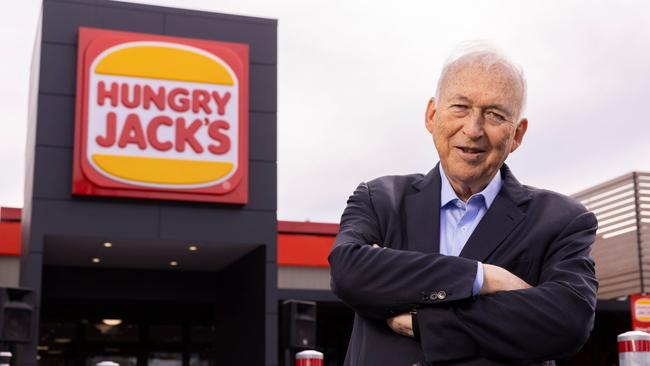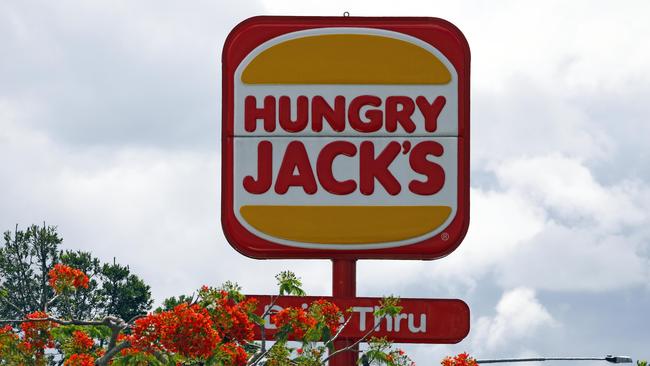Jack Cowin’s Hungry Jack’s empire hits $2bn in annual sales
Billionaire fast food king Jack Cowin says his Hungry Jack’s empire is largely immune to tightening interest rates as his burger chain hit $2bn in annual sales for the first time.

Billionaire fast food king Jack Cowin says his Hungry Jack’s empire is largely immune to tightening interest rates, and the threat of another rate hike by the RBA on Melbourne Cup day, as his burger chain hit $2bn in sales for the first time since opening in Australia 54 years ago.
Mr Cowin told The Australian that while 30 years ago a burger and fries at his Hungry Jack’s chain might have been considered a “treat” and therefore exposed to economic cycles and tightening household budgets, now it was more viewed as a standard meal option across the week.
“I think if you are buying a new car or buying a new house that (interest rates are) probably a factor but we are in a different category now. We are now part of the ordinary way of life these days than if you went back 30 years ago when we were in the treat business and probably more vulnerable,” Mr Cowin told The Australian on Monday.
“In fast food the service has to be good, staff have to be friendly, the food has got to be hot and you have to be able to execute the business and I think we are doing an excellent job at that right now and it is translating into sales.”

Mr Cowin’s Competitive Foods, the private company that houses his Hungry Jack’s empire and is majority owned and chaired by the billionaire, has pulled off record sales for 2023 with its latest accounts showing annual revenue of just over $2bn, up from $1.776bn in 2022.
It is the first time that Hungry Jack’s has gone over the $2bn sales threshold since the business was founded in 1969 by Mr Cowin, who raised $10,000 each from 30 fellow Canadians – not bad for an untested kid in his 20s – and then came to Australia to open his first Hungry Jack’s in Perth.
The genesis of the Hungry Jack’s name has nothing to do with Mr Cowin, but was a borrowed trademark from a US firm that sold pancake mix and mashed potatoes in supermarkets. Today he has 455 Hungry Jack’s stores across the country and Mr Cowin is ranked as Australia’s 22nd wealthiest person with personal wealth of $4.21bn according to The Australian’s Richest 250 List.
Those early Canadian investors who kept their stake in the company still own 2 per cent of the Hungry Jack’s empire, with each original $10,000 investment now worth more than $40m.
Mr Cowin said Hungry Jack’s improved sales in 2023, up around 12.6 per cent, driven by a mix of passing on inflation to consumers in the form of higher menu prices as well as growing customer orders that includes taking market share from rival burger chains and other fast-food outlets.
“When it comes to industry data, we are kind of top of pops in terms of growth and according to the industry numbers we are seeing the answer is yes, we are taking market share,” Mr Cowin said.
He said menu prices rose by around 4 to 5 per cent in 2023.
“We are doing less discounting probably than we ever done, and at the end of the day our business really revolves around the customer experience and execution and I think we are fortunate that we are doing a pretty good job and seeing it in sales.”
Mr Cowin said the recent performance of Hungry Jack’s had not shown any strains of the last 12 months of interest rate rises and he was not concerned about a hit to his business from a possible rate rise again on Melbourne Cup day.
“We haven’t really see that (interest rates) impact our business, but I think we are part of daily living now. It isn’t really a ‘big ticket’ purchase.”
The profitability of Competitive Foods did fall however, dropping from a profit of $100.19m in 2022 to $73.86m in 2023, driven partly by discontinued operations from the 2023 accounts and a sharp rise in raw material costs and staff costs.
Although as the company remains in private hands its movement in profits is of lesser importance than if it was a public company.
Mr Cowin said building costs to construct new Hungry Jack’s stores remained high but he was planning to roll out as many as 25 new stores this year – which was above average.
He said key commodities such as beef was moderating in prices although that was countered by rising wages costs.






To join the conversation, please log in. Don't have an account? Register
Join the conversation, you are commenting as Logout